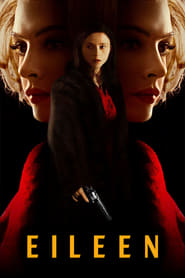Cambridge Film Festival 2023: Film #18
A fun but ultimately slight lesbian psychosexual thriller that could easily have been originally written by Patricia Highsmith... and, indeed, one of the characters is called 'Rebecca' for this reason. Not sure what the retro-historical aesthetics were in aid of (versus simply setting it in the past) beyond trying to perfume the film with a whiff of postmodernity, and a number of scenes had the clear signs of 'adapted from a recently popular book'. But not only was it very pleasant to look at, it was jolly nice to finally see some 'drunk ex-cop father who doesn't beat his children' representation for a change.
With the setting, age difference and styling, there are obvious comparisons to Todd Haynes’s Carol, but the film is far less open about its queerness, in ways that intrigue but also frustrate. Eileen’s magnetic pull to Rebecca is hard to define in a way that many queer people can understand. Do I want to befriend this person? Do I want to be with this person? Or do I want to be this person?
— Benjamin Lee (The Guardian)
Rebecca is the catalyst for the changes Eileen begins to make. Finally, someone is truly seeing her for who she is and can be. For the first time in a long time, Eileen feels alive and in control of where she might go. But the final act doesn’t work as well as it should despite Eileen’s growth. It diminishes much of the groundwork Oldroyd spent so much time fleshing out in the first half. The twist takes a quick shortcut to get to the story’s conclusion, while leaving the state of things open-ended and ominous. The lack of resolution is perfectly fine, though it would have worked better had the twist been earned.
— Mae Abdulbaki (Screen Rant)
[It’s] off-kilter, repulsive and garishly sexy. Eileen’s obsession soon rises to Hitchockian and Bergmanian levels, as she studies and inhabits Rebecca’s drink of choice and lipstick-stained cigarettes like she’s between the frames of Persona or Rebecca rather than Carol.
— Shayna Maci Warner (Paste Magazine)
A striking difference between the two Eileens [i.e. the book vs. the film] is exemplified by the pivotal moment when she is given her father’s gun for safekeeping. In the book, Eileen holds it with reverence, then drops it in her purse, unsure of what to do with the object. [B]y contrast, when Eileen is given the gun in the film, a daydream begins wherein she promptly shoots herself in the jaw. (As if one violent fantasy isn’t enough, there is a second daydream where Eileen shoots her father in the chest.) While the novel subtly shows Eileen’s understanding of the weapon, the moment on-screen becomes a heavy-handed insight into the character’s unconscious mind. A gun shown in the first act of a story must be fired before the end. When Chekhov said this, he didn’t mean you should have the character think about shooting it every 20 minutes.
— Brianna Di Monda (Los Angeles Review of Books)

